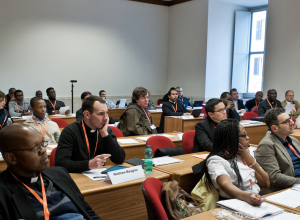
On February 5, 2018, a course of formation "Program of Church Management" for priests, lay persons and members of religious orders who work for the Church in economic and administrative capacities, begins, organized by the Markets, Culture & Ethics Research Center.
The Program of Church Management consists in two terms, with 4 full time weeks and a total of 296 teaching and training hours.
Will be hold in partnership with: the LUISS Business School of Rome, the Catholic University of America in
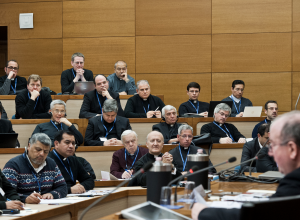
From February 5 to 9, 2018, the Fifth Study Week for Seminary Formation Staff, organized by the Center for Priestly Formation on the theme Teaching and Learning to Love Human Affectivity and Christian Chastity, will take place.
The Fifth Study Week is addressed to the formators of candidates for the priesthood who have matured sufficient “on the ground” experience to be able to rise a common reflection and an enriching exchange between the various protagonists of the direction of the seminaries.
The activity will be developed in Italian language
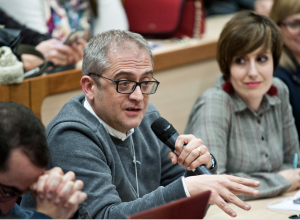
On Tuesday, January 30, 2018, the University hosted a working session of the Assembly of diocesan delegates of the media of Spain, which took place this year in Rome.
Professors Juan Narbona, Jordi Pujol and Manuel Sánchez, of the School of Church Communications, offered some keys for reading the Church in the current era.
Among those present, some Bishops of Spain and alumni of the School of Church Communications.
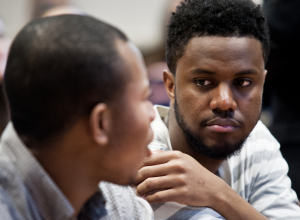
Students from the University of Missouri-Columbia's School of Journalism were hosted by the School of Church Communications, on the Roman stop of their "Europe Tour 2018."
In addition to the University, they visited St. Peter's Basilica, and the Vatican Museums.

Social media and digital tools is a theme for the specialization course for non-profit organizations, organized from January 26, to February 23, 2018 by the School of Church Communications in collaboration with Harambee Africa International and the ISCOM Association.
The course aims to provide a theoretical and practical specialization with the goal of making most of the online communication and digital identity of non-profit organizations on the most important social media.
More information
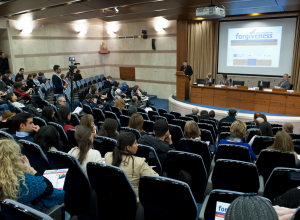
On January, 18, 2018, on the initiative of the Markets, Culture & Ethics Research Center, the first Rome Conference on Forgiveness, took place.
The Conference, in collaboration with the International Forgiveness Institute, the Rotarian Action Group for Peace, and the Relational Ontology Research, concerned the Virtue of Forgiveness Formation in Educational Programs to Promote Peace.
Program
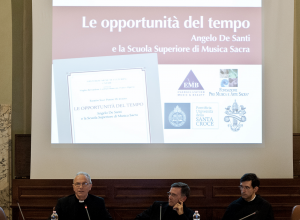
On Wednesday, January 17, 2018, the presentation of the book "Le opportunità del tempo. Angelo De Santi e la Scuola Superiore di Musica Sacr took place.
With the author, rev. prof. Ramón Saiz-Pardo, intervened Mons. Mº Vincenzo De Gregorio, Dean of the Pontifical Institute of Sacred Music and p. Jordi Agustí Piqué i Collado, OSB, Dean of the Pontifical Liturgical Institute.
Invitation
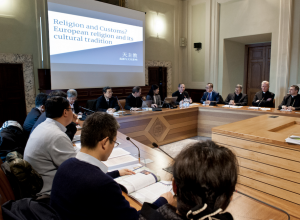
“Religion and Custom – European religion and its cultural and its cultural tradition” was the theme of the meeting which was held at the University in January, in which the delegation of the Chinese scholars belonging to various institutions, universities and research groups took part, among them the Chinese Academy of Social Sciences (CASS).
To welcome them were, the rector Luis Navarro and Bishop Juan Ingacio Arrieta, the Secretary of the Pontifical Council for Legislative Texts and the professor emeritus of the Faculty of Canon Law.
The meeting was preceded by a photographic presentation, curated by Vittoria Tam, on the “History of Salvation” and its influence on the Christian art in various cultural areas of the
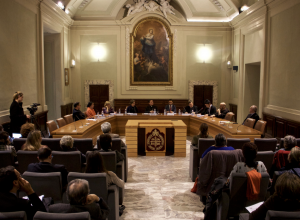
From the 9th January 2018 the course The Religious Traditions. History, Identity, Social Experiences take place, organized by the ISCOM Association, with the collaboration of the Pontifical Institute of Arabic and Islamic Studies and the Pontifical Council for Interreligious Dialogue.
The course intends to supply “a basic information on the structure of the main religious traditions that – as such – form the foundation of the different cultures, influencing the social formations, hierarchical structures, and political and economic lives of different countries”, explains the organizers.

